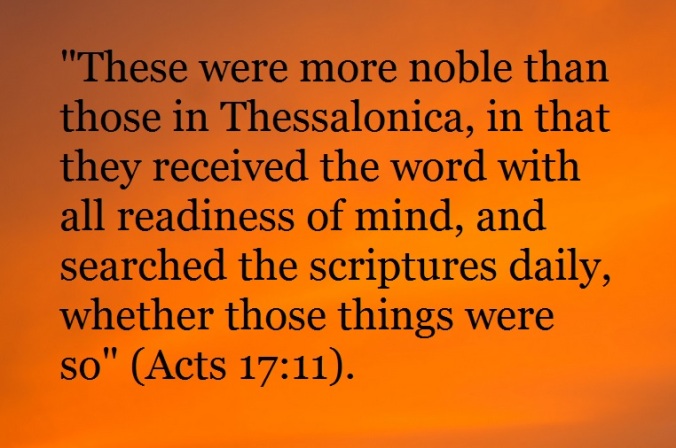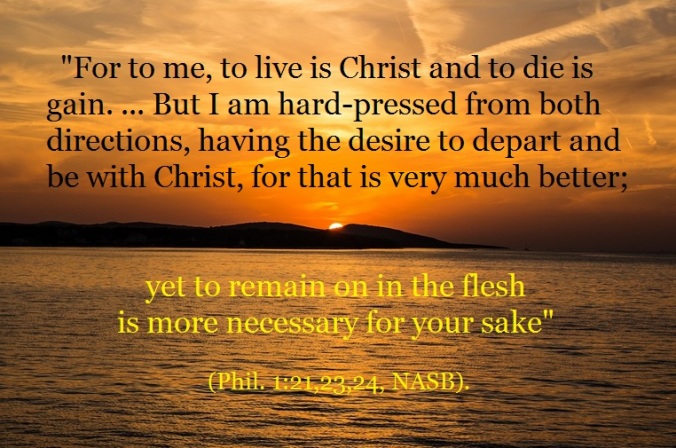“Go therefore and make disciples of all the nations…teaching them to observe all that I commanded you; and lo, I am with you always, even to the end of the age” (Matthew 28:19-20, NASB).
——————–
Contents:
1) Readiness of Mind (L.A. Stauffer)
2) The Best is Yet to Be! (Tommy Thornhill)
——————–

-1-
Readiness of Mind
L.A. Stauffer
After the apostle Paul departed from the city of Thessalonica, he left behind a few believers, but the Jews in general had closed their minds to the message that “Jesus is the Christ.” These Jews had access in their synagogue to scrolls of Old Testament scriptures. Paul preached from these scriptures that Jesus of Nazareth died for their sins and arose from the dead to prove He is the Messiah the prophets of their nation had anticipated for centuries. Although a few men of that city believed, a host of rabble rousers closed their minds, refused to countenance such an idea, stirred up persecution against the saints, and forced the apostle to “get out of town” late one night (see Acts 17:1-9).
Paul made his way some 50 miles down the road to the city of Berea. Again, as was his custom, Paul entered a synagogue of the Jews and began the same process over — alleging and demonstrating from the Old Testament scriptures that Jesus of Nazareth is the Christ. The apostle found among these Jews open and receptive hearts — men who honestly and eagerly examined the scriptures Paul read in their midst. Luke tells us that these men of Berea not only received Paul’s teaching, but they daily examined the scriptures to determine “whether these things were so” (Acts 17:11).
When Luke commends the nobility of these Bereans, he made specific note not only of their study habits but also their “readiness of mind” (Acts 17:11). This attitude was prerequisite and fundamental to their willingness to examine and study the scriptures daily. The word “readiness” combines a preposition “before” and the word “mind” to describe the mindset of the Bereans before their study of the scriptures even began. The “mind” is essential to man’s examination or study of the scriptures, but its “before” condition determines whether that study ever takes place. The mind, as the Greek word suggests, must be “ready.”
The minds of the Jews at Berea, as Jews everywhere, were conditioned by scripture to anticipate at some point in their history the arrival of a Messiah — an anointed savior. Hundreds, even thousands, of years had passed since the first prophecies of the coming Messiah and many Jews had become lethargic and indifferent about its prospects. Others were so misinformed that Jesus didn’t fit the pattern of their thinking and was dismissed as perverse and false.
The Bereans, however, were different. They were both excited about the claim and the scriptures that proved it. When Paul unrolled the scrolls of the Old Testament writings and announced Jesus as the Messiah, their minds were “ready,” “eager,” and “prepared” to examine the prophecies and Paul’s application of them to Jesus.
Would it not be wonderful today if every one of us who claim to be Christians was this eager to grow in Bible knowledge and Christ-like character? If we were, we would daily open our Bibles, examine verses and chapters, and answer a few simple questions that are designed to prepare our hearts for Sunday and Wednesday Bible studies and our lives for eager service in God’s kingdom.
Think, brethren, how much each of us would grow in wisdom and stature with God; think of the knowledge and strength we would gain in preparation for living in an ungodly world of sin; think of the deepened faith we would have in God and in His word; think of the love and care we would begin to show one another; and think of the zeal and enthusiasm we would have to teach sinners.
When Bereans had this kind of mind, God called them “noble” — a word that means of “high rank.” That’s who we’d be in God’s kingdom. Not only an “elect race,” a “holy nation,” a “royal priesthood,” but also “noble citizens” ranking high in the mind of God. How special would that be, brethren?
— Via The Auburn Beacon, May 22, 2016
——————–

-2-
The Best is Yet to Be!
Tommy Thornhill
I don’t know of how you, the readers, look at life, but I always try to look at things with the attitude that THE BEST IS YET TO BE. Being optimistic about the future is certainly better than looking back at the way things were. This view gives me a reason for being happy in a sin-sick world, but not in the way this world thinks of being happy.
Our nation’s founding fathers proclaimed in the Declaration of Independence that the pursuit of happiness is an “unalienable right” of mankind. Since then it seems that people have taken it for granted that being happy is their God-given right, regardless of how it is gained. They want to be happy but most never attain true happiness for they don’t know where to find it. They think it is found in the things of this world. But John tells us we are not to “love the world or the things in the world …the lust of the flesh, the lust of the eyes, and the pride of life – is not of the Father but is of the world. And the world is passing away, and the lust of it” (1 John 2:15-17). The word “lust” means desire, and is generally condemned as “inordinate affections.” Even if the things some desire in this world are not sinful, they are at best still temporary. So, in the end those who seek happiness in the things of this world will have to say, like Solomon, “all is vanity, and a striving after wind” (Eccl. 1:14). Those who seek happiness in serving God and doing His will are the truly happy ones. They know there will be a better world to come.
A man, lying on his death bed, was surrounded by his family. They were grieving over his impending departure from this life. While waiting for the inevitable, he says to them, “Don’t worry about me, the best is yet to be.” Why could he say this? Because he was a Christian with “a living hope” (1 Pet. 1:3-5; Phil 3:20-21). He understood how and why he had lived his life. Like Paul, he had committed his soul to God for safe keeping (2 Tim. 1:12). He knew his experiences in life, good and bad, were only temporary, so he had used his time to prepare for the better life to come (2 Cor. 4:16-18). He knew the best was yet to come and was looking forward to it with optimism.
One with this view is truly a “blessed man” (Jas. 1:12). Many simply translate the word “blessed” (Gk. makarious) as happy. They view the word with human understanding. They think to be blessed means power, wealth, sensual pleasure, etc. Others see the word “blessed” with a sanctimonious flavor, as a technical word of theology, i.e. such as being blessed by some religious ritual performed by a reverend, rabbi, priest, or maybe the Pope. Such thinking obscures its deeper meaning. As used in the NT, one that is blessed has gained the highest happiness a human being can enjoy in this world. It is the state of spiritual and moral prosperity that people share only in Christ.
Jesus used the word nine times in what is referred to as the beatitudes of Matt. 5:3-12, where He describes the truly “blessed” (happy) man. John, in his Revelation letter also records seven beatitudes of the blessed ones, Rev. 1:3; 14:13; 16:15; 19:9; 20:6; 22:7,14. The ones who possess spiritual happiness do not depend on the ever-changing conditions in the world. The blessings can only be lost if one chooses to change his mind toward God. The blessed man, knowing the best is yet to be, is an eternal optimist.
So, how does the optimist know the best is yet to be? Because he places his trust in God, who is always faithful: 1 Cor. 1:9; Heb. 6:18; 10:23; 1 Pet. 4:19. This faithful God will sustain those who trust Him: Ps. 37:23-40; Phil. 4:11-12. This belief allows one to be content and satisfied, not in life’s circumstances but in his attitude — that regardless of life’s outcome it will be better later. To such people, peace of mind and joy in life is not dependent on material things. They trust God to make things right in His time. They know the best is yet to be because God said so.
Such optimism will make your life richer. Why? Because the Christian knows things the world do not.
1. The optimistic Christian knows that when this physical body returns to the dust after death, we will be clothed with a better one (Read 2 Cor. 5:1-ff). “For we KNOW that if our earthly house, this tent, is destroyed we have a building from God, a house not made with hands, eternal in the heavens…” So, the best is yet to be.
2. The optimistic Christian knows that by trusting God things will work out for good, even though it seems impossible at the time — Rom. 8:28: “And we KNOW that all things work together for good to those who love God, to those who are the called according to His purpose.” So, the best is yet to be.
3. The optimistic Christian has no doubt about the security of his soul (2 Tim. 1:12). “…I am not ashamed, for I KNOW whom I have believed and am persuaded that He is able to keep what I have committed to Him until that day.”
Yes, the best is yet to be because the one who has been saved in faithful obedience has this promised salvation, promised by God: “…kept by the power of God through faith for salvation ready to be revealed in the last time” (1 Pet. 1:3-5).
Without an optimistic attitude you will be content with mediocrity, just drifting along with no goal in life. Your life will be one of fear, insecurity and hopelessness. But by being optimistic, thinking the best is yet to be, you will have much better outlook on life. You will have something to believe in. You will have a sense of direction in life providing you with a goal (reason) to live. You will have a spirit of expectancy that it will be better later. This is your anchor for life (Rom 8:24-25; Heb. 6:19).
— Via The Old Hickory Bulletin, February 5, 2017, Volume 37, Number 6
——————–
The Steps That Lead to Eternal Salvation
1) Hear the gospel, for that is how faith comes (Rom. 10:17; John 20:30,31).
2) Believe in the deity of Christ (John 8:24; John 3:18).
3) Repent of sins (Luke 13:5; Acts 17:30).
4) Confess faith in Christ (Rom. 10:9,10; Acts 8:36-38).
5) Be baptized in water for the remission of sins (Mark 16:16; Acts 2:38; 22:16; Rom. 6:3,4; Gal. 3:26,27; 1 Pet. 3:21).
6) Continue in the faith, living for the Lord; for, if not, salvation can be lost (Heb. 10:36-39; Rev. 2:10; 2 Pet. 2:20-22).
——————–
Tebeau Street
CHURCH OF CHRIST
1402 Tebeau Street, Waycross, GA 31501
Sunday services: 9:00 AM (Bible class); 10 AM & 5 PM (worship)
Wednesday: 7 PM (Bible class)
evangelist/editor: Tom Edwards (912) 281-9917
Tom@ThomasTEdwards.com
http://thomastedwards.com/go (Older version of Gospel Observer website without pictures, but back to March 1990)
http://tebeaustreetchurchofchrist.org/
http://ThomasTEdwards.com/audioser.html (audio sermons)